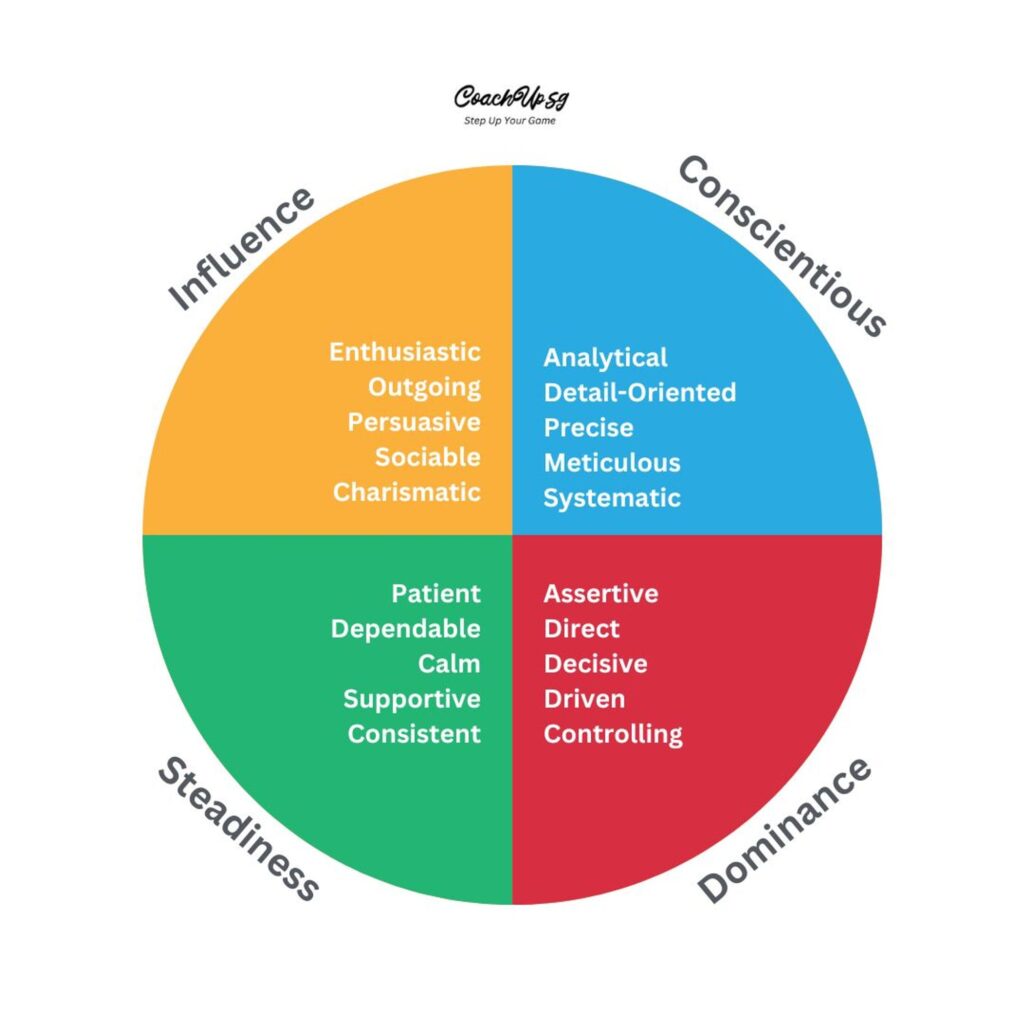Effective leadership depends on understanding both yourself and your team. One of the most insightful tools for this is the DISC personality model. DISC helps you dive into different behavioural styles, enabling you to improve communication, resolve conflicts, and improve team performance. For mid-level executives and HR professionals, understanding DISC can be a game-changer.
DISC stands for Dominance, Influence, Steadiness, and Conscientiousness. Each of these traits represents a different way of interacting with the world and with others. By understanding these traits, you can identify strengths and areas for development within yourself and your team. This understanding allows you to adapt your leadership approach to meet the needs of different team members and situations.
Let’s explore the basics of the DISC personality model, explain the four DISC types, and discuss how DISC can improve your leadership skills. By applying these insights, you’ll be better equipped to lead more effectively and create a more cohesive, productive team environment.
The Basics of DISC Personality Models

The DISC personality model is a tool used to understand human behaviour. It helps us recognise how people respond to different situations and interact with others. The model divides behaviour into four main traits: Dominance, Influence, Steadiness, and Conscientiousness.
- Dominance: This trait focuses on task completion and results. People with high Dominance are direct, assertive, and enjoy control. They prefer to take charge and are often seen as leaders.
- Influence: Influence is about social interaction and communication. People high in this trait are enthusiastic, outgoing, and persuasive. They thrive in team settings and enjoy fostering relationships.
- Steadiness: Steadiness revolves around loyalty and dependability. Individuals with high Steadiness are patient, accommodating, and prefer stability. They are great team players and provide consistent support.
- Conscientiousness: This trait is oriented towards accuracy and quality. People who score high in Conscientiousness are analytical, detail-oriented, and methodical. They strive for precision and value procedure.
Understanding these traits helps you recognise your own behavioural style as well as those of your team members. This awareness allows you to adapt your communication and leadership strategies accordingly.
Ways DISC Improves Leadership Skills
The DISC model offers a structured approach to improving leadership skills by providing insights into your natural tendencies and those of your team. This understanding can significantly improve how you lead.
1. Improving Communication: By understanding the DISC profiles of your team members, you can tailor your communication to be clearer and more effective. For example, a person high in Dominance may appreciate direct and concise instructions, while someone high in Steadiness might prefer a more detailed and patient approach.
2. Building Stronger Teams: Knowing the DISC profiles within your team helps you allocate tasks that align with individual strengths. This results in better teamwork and higher productivity. For example, those high in Influence could excel in roles that require interaction and motivation.
3. Conflict Resolution: DISC helps in identifying potential areas of conflict based on different personality traits. Understanding these can help you mediate conflicts more effectively. A person high in Conscientiousness might clash with someone high in Influence due to differing priorities, but recognising this allows for more targeted conflict resolution strategies.
4. Motivating Your Team: Each DISC type has unique motivators. Dominant individuals might be driven by goals and challenges, while those high in Steadiness may value a supportive and secure environment. Understanding these motivators helps you inspire your team effectively.
By leveraging these aspects of DISC, you can become a more adaptable and responsive leader, capable of addressing the diverse needs of your team.
Applying DISC Insights to Leadership Practices
Applying DISC insights to your leadership practices can bring substantial improvements. Here are some practical ways to integrate DISC into your leadership strategy.
1. Customising Feedback: Tailor your feedback to match the DISC profile of your team members. For example, constructive and direct feedback should be given to dominant types while offering supportive and encouraging feedback to those high in steadiness.
2. Adapting Leadership Style: Flex your leadership style to suit different situations and team members. A more directive style may work well with dominant individuals, while a collaborative approach might be better for those with high influence or steadiness.
3. Improving Team Meetings: Use DISC to structure team meetings for maximum efficiency. For instance, start with high-level goals for Dominant types and allow open discussions for Influential team members to express their ideas. Ensure everyone feels heard and valued.
4. Delegating Tasks: Assign tasks based on DISC traits to play to each person’s strengths. Analytical tasks might be best for those high in Conscientiousness, while client-facing roles could be ideal for Influential team members.
By adopting these practices, you align your leadership approach with the unique traits of your team, fostering a more harmonious and effective working environment.
Unlocking Your Leadership Potential: The Power of DISC
Understanding the DISC personality model is a powerful tool for improving leadership skills. By recognising and adapting to different behavioural styles, you can improve communication, build stronger teams, and resolve conflicts more effectively. These skills are crucial for any mid-level executive aiming to advance their career and lead more successfully.
At CoachUp.sg, we are dedicated to helping you unlock your leadership potential. Our DISC Workshops and other coaching services in Singapore are designed to provide you with the insights and tools you need for personal and team growth. Discover how our tailored programs can make a difference. Contact CoachUp.sg today to take the first step towards becoming a more effective leader!

